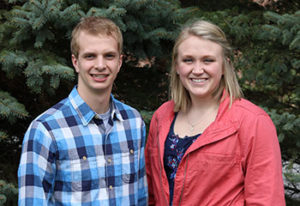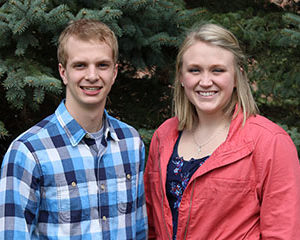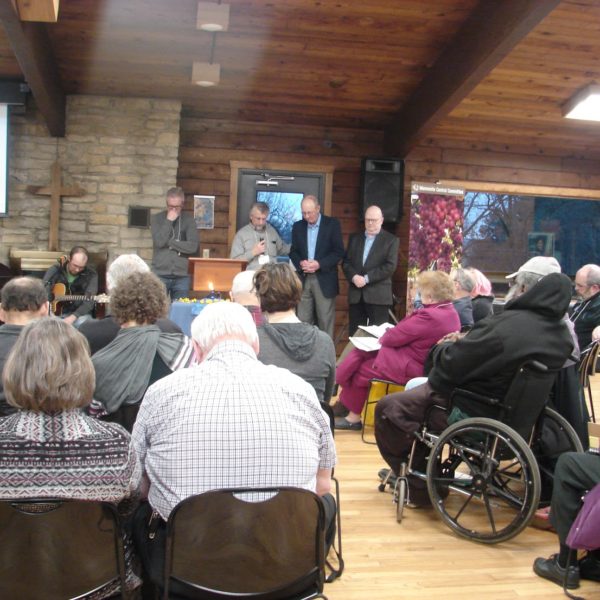MAY DAY ROYALTY
MAY DAY ROYALTY
Bluffton University’s annual May Day ceremony will take place at 1:30 p.m. Saturday, May 6, and will include the traditions of the crowning of a king and queen and the Maypole dance by first-year students.
Filling the roles of king and queen this year are seniors CHAD GUNDY of Flanagan, Ill., and RACHEL BEINING of Ottoville, Ohio.
Gundy is majoring in mathematics and information technology. He has been involved in many activities on campus including Camerata Singers and the Ultimate Frisbee Club. He has served as a resident adviser for three years. His parents are Gary ’84 and Carolyn (Stuckey ’85) Gundy.
Beining is majoring in food and nutrition. She is a member of the Bluffton University Nutrition Association (BUNA) and was a member of the varsity women’s basketball team for four years. Her parents are Jerry and Sue Beining.

Church Spotlight: First Mennonite Church of Champaign/Urbana
The following is a snapshot of congregational life at First Mennonite Church of Champaign-Urbana provided by Rebecca Bare. If you would like more information on news shared here, please contact the congregation directly. We’re sure they’d love to hear from you.
A Habitat House blessing was held on Feb. 19 for the house that FMC is helping to build.
Kathy and Keith Springer spent the month of March in Mississippi volunteering through SOOP. They did home repair, tutoring, and painting. They related their experiences to us on April 30.
Harold and Mary Ann Heiser celebrated their 68th anniversary on March 4.
The theme for Lent was Enliven Us O God. Each Sunday, we focused on a different aspect: wonder, hunger, thirst, see.
Jan Sabey, Rebecca Bare, Keith and Kathy Springer, Deb Sutter, and the Crosby family were the delegates to the Illinois Mennonite Conference meeting at Menno Haven on April 1.
We celebrated Easter with lots of music from our choir and concluded the worship service with the Hallelujah Chorus.
Sheryl and Peter Dyck shared with us their experiences with SOOP in Puerto Rico in January.
Bharat Phillipe and Joyce Wyse announced their engagement. They will be married in June.
Dannie Otto preached on April 30 and Jonathan Kuttab, a Palestinian Mennonite and human rights lawyer, preached on May 14.
Bluffton University graduates from Illinois Mennonite Conference – Jena O’Brien
BLUFFTON, Ohio— The achievements of more than 230 undergraduate and graduate students were celebrated on Sunday, May 7, 2017, during the 117th Commencement ceremony at Bluffton University.
Undergraduates from Illinois conference include:
Chad Gundy from Flanagan, Ill., earned bachelor’s degrees in math and information technology with a minor in computer science. Chad received the Distinguished Scholar Award for information technology and for mathematics. He was a member of the 2016-17 Pi Delta Society. Chad is a member of Prairieview Mennonite Church.
Rachel Schoener of Flanagan, Ill., earned a bachelor’s degree in social work. Rachel received the Distinguished Scholar Award for social work. She is also a part of the honors program and a member of the 2016-17 Pi Delta Society. Rachel is a member of Prairieview Mennonite Church.
Bluffton University is a liberal arts, residential campus with more than 80 undergraduate majors, minors and programs; and adult degree-completion programs in accounting, organizational management and RN to BSN. Bluffton also has MBA programs and offers master’s degrees in organizational management and education.
Founded in 1899 and affiliated with Mennonite Church USA, the university is located in Northwest Ohio. It has an enrollment of around 1,000 students and 16 NCAA Division III athletic teams.
Bluffton’s 100-year legacy is expressed today in its enduring values of discovery, community, respect and service that are woven into the academic program and campus life. Bluffton students go into the world prepared for life as well as for their chosen vocations.
#IMCweekly
#IMCweekly 4/12/2017 edition
To view the #IMCweekly edition 4/12/2017 please click on link below






